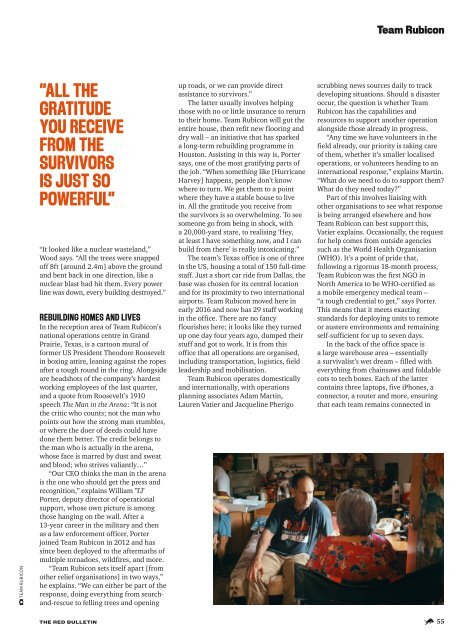You also want an ePaper? Increase the reach of your titles
YUMPU automatically turns print PDFs into web optimized ePapers that Google loves.
Team Rubicon<br />
TEAM RUBICON<br />
“ALL THE<br />
GRATITUDE<br />
YOU RECEIVE<br />
FROM THE<br />
SURVIVORS<br />
IS JUST SO<br />
POWERFUL”<br />
“It looked like a nuclear wasteland,”<br />
Wood says. “All the trees were snapped<br />
off 8ft [around 2.4m] above the ground<br />
and bent back in one direction, like a<br />
nuclear blast had hit them. Every power<br />
line was down, every building destroyed.”<br />
REBUILDING HOMES AND LIVES<br />
In the reception area of Team Rubicon’s<br />
national operations centre in Grand<br />
Prairie, Texas, is a cartoon mural of<br />
former US President <strong>The</strong>odore Roosevelt<br />
in boxing attire, leaning against the ropes<br />
after a tough round in the ring. Alongside<br />
are headshots of the company’s hardest<br />
working employees of the last quarter,<br />
and a quote from Roosevelt’s 1910<br />
speech <strong>The</strong> Man in the Arena: “It is not<br />
the critic who counts; not the man who<br />
points out how the strong man stumbles,<br />
or where the doer of deeds could have<br />
done them better. <strong>The</strong> credit belongs to<br />
the man who is actually in the arena,<br />
whose face is marred by dust and sweat<br />
and blood; who strives valiantly…”<br />
“Our CEO thinks the man in the arena<br />
is the one who should get the press and<br />
recognition,” explains William ’TJ’<br />
Porter, deputy director of operational<br />
support, whose own picture is among<br />
those hanging on the wall. After a<br />
13-year career in the military and then<br />
as a law enforcement officer, Porter<br />
joined Team Rubicon in 2012 and has<br />
since been deployed to the aftermaths of<br />
multiple tornadoes, wildfires, and more.<br />
“Team Rubicon sets itself apart [from<br />
other relief organisations] in two ways,”<br />
he explains. “We can either be part of the<br />
response, doing everything from searchand-rescue<br />
to felling trees and opening<br />
up roads, or we can provide direct<br />
assistance to survivors.”<br />
<strong>The</strong> latter usually involves helping<br />
those with no or little insurance to return<br />
to their home. Team Rubicon will gut the<br />
entire house, then refit new flooring and<br />
dry wall – an initiative that has sparked<br />
a long-term rebuilding programme in<br />
Houston. Assisting in this way is, Porter<br />
says, one of the most gratifying parts of<br />
the job. “When something like [Hurricane<br />
Harvey] happens, people don’t know<br />
where to turn. We get them to a point<br />
where they have a stable house to live<br />
in. All the gratitude you receive from<br />
the survivors is so overwhelming. To see<br />
someone go from being in shock, with<br />
a 20,000-yard stare, to realising ‘Hey,<br />
at least I have something now, and I can<br />
build from there’ is really intoxicating.”<br />
<strong>The</strong> team’s Texas office is one of three<br />
in the US, housing a total of 150 full-time<br />
staff. Just a short car ride from Dallas, the<br />
base was chosen for its central location<br />
and for its proximity to two international<br />
airports. Team Rubicon moved here in<br />
early 2016 and now has 29 staff working<br />
in the office. <strong>The</strong>re are no fancy<br />
flourishes here; it looks like they turned<br />
up one day four years ago, dumped their<br />
stuff and got to work. It is from this<br />
office that all operations are organised,<br />
including transportation, logistics, field<br />
leadership and mobilisation.<br />
Team Rubicon operates domestically<br />
and internationally, with operations<br />
planning associates Adam Martin,<br />
Lauren Vatier and Jacqueline Pherigo<br />
scrubbing news sources daily to track<br />
developing situations. Should a disaster<br />
occur, the question is whether Team<br />
Rubicon has the capabilities and<br />
resources to support another operation<br />
alongside those already in progress.<br />
“Any time we have volunteers in the<br />
field already, our priority is taking care<br />
of them, whether it’s smaller localised<br />
operations, or volunteers heading to an<br />
international response,” explains Martin.<br />
“What do we need to do to support them?<br />
What do they need today?”<br />
Part of this involves liaising with<br />
other organisations to see what response<br />
is being arranged elsewhere and how<br />
Team Rubicon can best support this,<br />
Vatier explains. Occasionally, the request<br />
for help comes from outside agencies<br />
such as the World Health Organisation<br />
(WHO). It’s a point of pride that,<br />
following a rigorous 18-month process,<br />
Team Rubicon was the first NGO in<br />
North America to be WHO-certified as<br />
a mobile emergency medical team –<br />
“a tough credential to get,” says Porter.<br />
This means that it meets exacting<br />
standards for deploying units to remote<br />
or austere environments and remaining<br />
self-sufficient for up to seven days.<br />
In the back of the office space is<br />
a large warehouse area – essentially<br />
a survivalist’s wet dream – filled with<br />
everything from chainsaws and foldable<br />
cots to tech boxes. Each of the latter<br />
contains three laptops, five iPhones, a<br />
connector, a router and more, ensuring<br />
that each team remains connected in<br />
THE RED BULLETIN 55

















